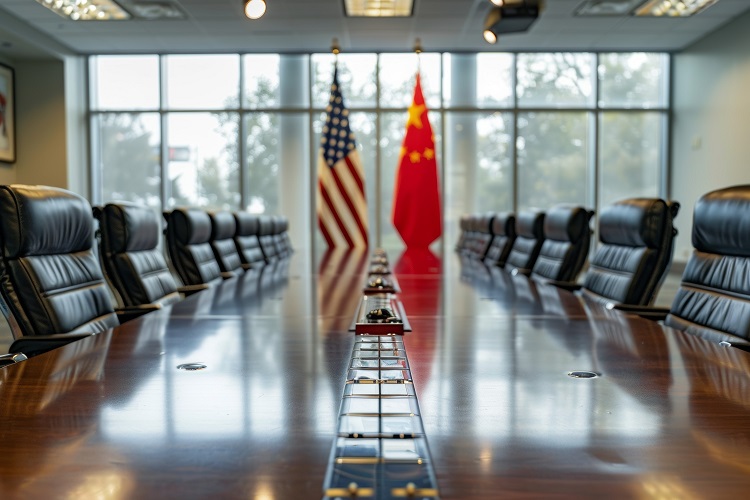President Donald Trump has always had his Nixonian characteristics, from a power-hungry (sometimes illegal) mode of operations at home to a desire to rebalance the burdens and benefits of US leadership abroad. Israel’s remarkable victory over Iran has made it possible to imagine a revival of President Richard Nixon’s global strategy, in which America lightens its excessive load by delegating greater responsibility to friendly powers in crucial regions.
Reviving a decades-old Nixon Doctrine isn’t the worst idea for an overtaxed superpower. But it won’t work, ironically, without continued US engagement. And it may not work at all in Asia, where the original Nixon Doctrine arose.
Nixon’s doctrine was his answer to an earlier affliction of American overstretch, produced by the war in Vietnam. In July 1969, Nixon announced that the US would still honor its alliance commitments in Asia, but would henceforth expect those allies to do more in their own defense. It later evolved into a strategy that involved deputizing likeminded sheriffs in several key regions, thereby freeing the US for ambitious maneuvers on the global stage.
In the years that followed, the Shah’s Iran crushed Marxist rebels and destabilized pro-Soviet regimes in the Persian Gulf. An autocratic Brazil undermined leftist movements in South America. The apartheid regime in South Africa patrolled the south of that continent. Meanwhile, Nixon withdrew from Vietnam, reconciled with China, negotiated with the Soviet Union on nuclear weapons and rationalized the US global position.
A similar logic surely appeals to Trump. He has never seen much glory in upholding security commitments on the endangered peripheries. He has long sought to shock free-riding allies into looking after themselves. His goal is an America with greater freedom of action because it is no longer mired in in regional crises and conflicts.
His top Pentagon advisers argue that the US has more problems — preventing a nuclear Iran, supporting Ukraine against a Russian onslaught, countering China in the Western Pacific — than it can safely handle. And now Trump has proof, it seems, of how a new Nixon Doctrine might work.
Since October 2023, dating back to President Joe Biden’s administration, Israel has done America’s Middle Eastern bidding. In defending themselves, the Israelis have battered US enemies: Hamas, Hezbollah, the Houthis, and now Iran. Of course, Israel has had Washington’s assistance. But it nonetheless used its own power and initiative to reshape the region in ways that fundamentally favor the US.
Israel’s war against Iran even allowed Trump to belatedly employ US airpower and then claim credit for “obliterating” Tehran’s nuclear program. If the war facilitates a long-sought Israeli normalization with Saudi Arabia, it could foster a regional coalition well-positioned to keep Iran in check.
Trump would like something similar in Europe. He wants the Europeans to have primary responsibility for supporting Ukraine and protecting the continent. He can now claim to have kicked the North Atlantic Treaty Organization into higher gear on military spending. This week, he gave notice that Europe will henceforth own the financial burdens of providing military aid to Ukraine. Trump seems to envision a future in which European defense is anchored by key regional powers — France, the UK, Germany — in league with strong, committed frontline countries like Poland and Finland in the east.
Such an arrangement appeals because it would ease the Europe-Asia tradeoffs that bedevil an overextended superpower. But here, the challenges of a new Nixon Doctrine come into view.
First, outsourcing responsibility invariably involves losing some degree of control. In the 1970s, the Shah shocked Washington by cutting a deal with the Iraqi regime he had been harassing, thereby leaving America’s Kurdish allies in the lurch. In the 2020s, Israel dragged a reluctant Trump into its war with Iran, by brilliantly starting a fight that it couldn’t finish without US power. Proxies, it turns out, have minds of their own.
Second, Nixon 2.0 still demands persistent US engagement. Israel could not have thrashed its enemies without US support — weapons, diplomatic backing, help defending itself against Iranian drones and missiles — every step of the way. Even a more vigorous Europe will need US aid in checking Russia: providing the dominant airpower, command-and-control infrastructure, strategic nuclear deterrence and other unique capabilities that underpin the transatlantic defense.
Key regional security architectures have been built, over the span of decades, around US involvement. They won’t function if America absents itself from the fight.
Third, a neo-Nixonian strategy won’t work everywhere. The conditions are most conducive in the Middle East, where Israel is already the dominant military power. Nixon 2.0 is possible, but more challenging, in Europe, where America’s allies remain militarily deficient even though they outstrip Russia in economic power and spending on defense. The doctrine is a disaster in the making in the Indo-Pacific, where a China that is preparing rapidly for war vastly overmatches all of America’s friends combined.
If Washington seeks to subcontract its security obligations in Asia, it will leave the region at China’s mercy, or it will invite rampant nuclear proliferation as Japan, South Korea and other countries dash desperately for the bomb. The old Nixon Doctrine was born in Asia. That region might be the death of a reboot today.
source: American Enterprise Institute




